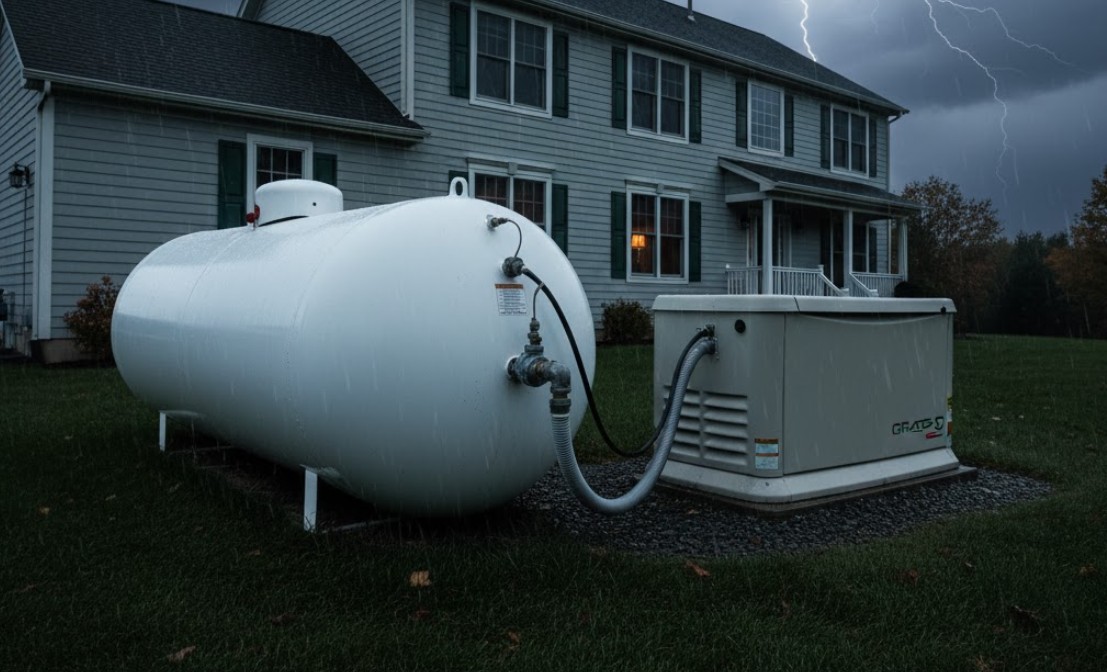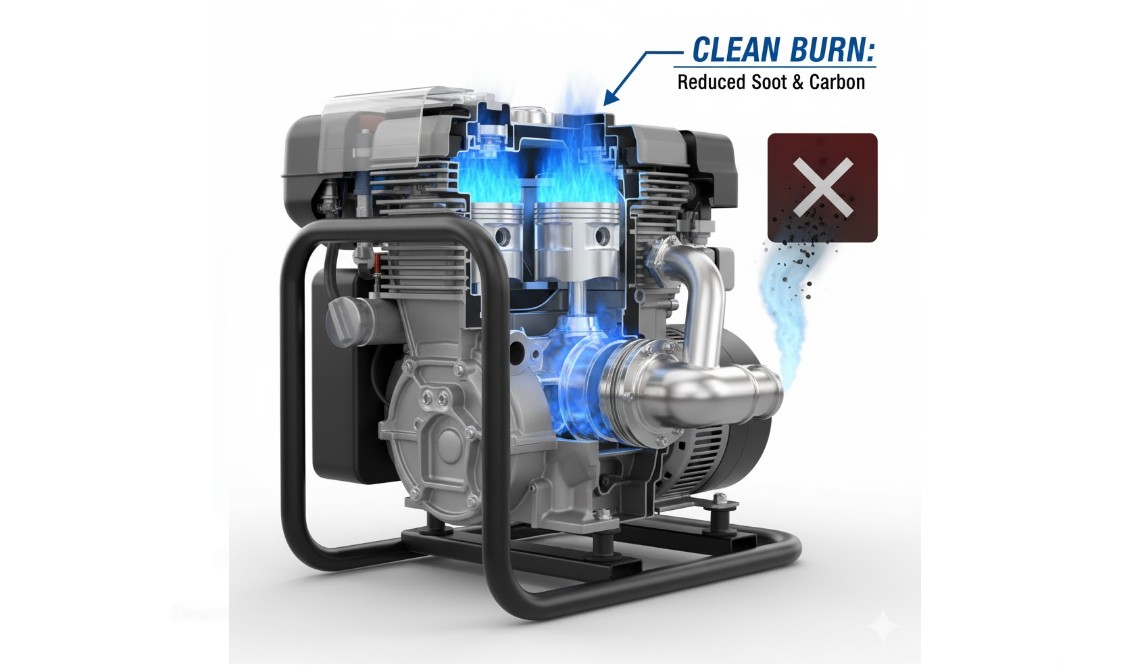In our increasingly interconnected world, a power outage is more than just an inconvenience; it can be a threat to comfort, security, and even health. As reliance on electricity for everything from heating and cooling to communication and security systems grows, the need for reliable backup power has never been more critical. While portable generators have long offered a temporary solution, the installation of a home standby generator has become the preferred choice for comprehensive protection.
Among the various options, generators fueled by liquid propane (LP) have emerged as a dominant and compelling choice for homeowners seeking seamless, long-duration backup power. Propane offers a unique blend of efficiency, clean burning, and superior logistics that other fuels simply cannot match, leading to significant Benefits of Standby Propane Powered Generators for Home resilience. This extensive guide delves into the essential advantages of choosing propane for your automatic backup power system, ensuring you can make the most informed decision for your family and property.
Fuel Logistics and Reliability: The Propane Advantage
The first and arguably most critical benefit of a propane standby generator is its superior fuel security, particularly during widespread emergencies.
Indefinite Shelf Life and Stability
Unlike gasoline or diesel, which begin to degrade quickly—often within months—liquid propane boasts an indefinite shelf life. This is a monumental advantage for a machine designed primarily for standby use. Propane is stored in a pressurized tank, remaining in perfect, ready-to-use condition for years. This eliminates the need for constant fuel rotation, stabilizers, or worry about clogged fuel lines and engine components. For anyone concerned about long-term preparedness, propane offers unmatched peace of mind.
A major concern with other fuels is degradation, which is why topics like fuel storage for generators are so frequently discussed. With propane, these concerns are virtually nonexistent, offering a truly ‘set it and forget it’ fuel solution.
Delivery During Disaster
In the aftermath of a major storm or regional grid failure, gasoline pumps often run dry, and refueling portable gasoline tanks can be risky and time-consuming. Propane, on the other hand, is delivered to a permanently installed tank on your property, which is often 500 gallons or larger. Propane supply infrastructure is robust and decentralized. Furthermore, propane tanks are typically accessible above ground, making them easier for delivery drivers to refill, even after significant weather events, compared to accessing underground natural gas lines that might be compromised.

Operational Superiority and Convenience
The very nature of standby generators—automatic operation—is perfectly complemented by the characteristics of propane fuel.
Automatic and Unattended Operation
A key difference between portable and home standby generators is the automatic transfer switch (ATS). When grid power fails, the ATS automatically starts the generator, switches the home’s power source, and then reverses the process when power is restored. Since propane is drawn directly from an existing, large fuel tank, the system can run unattended for days, if not weeks, depending on the tank size and load. This eliminates the hazardous and exhausting task of manually refueling a portable unit every few hours in adverse weather conditions.
This automatic feature makes propane standby generators invaluable for families, especially those with vulnerable members, or for homeowners who travel frequently. The seamless power transition is the primary reason many choose to invest in the best home standby generators available.
Cleaner and Quieter Performance
Propane is a fundamentally cleaner-burning fuel than gasoline or diesel. This results in significantly fewer emissions, making it an environmentally friendlier option for homeowners. More importantly for the generator itself, a cleaner burn translates to less carbon build-up on pistons and valves. This reduces engine wear and tear, extending the lifespan of the unit and minimizing maintenance frequency. Additionally, propane-fueled engines tend to run smoother and quieter than their diesel counterparts, an important consideration for suburban neighborhoods.
The Role of Fuel Delivery in Start-Up
Propane vaporizes readily, ensuring reliable starting, even in extreme cold—a challenge for diesel and sometimes gasoline. Because it’s a gaseous fuel during combustion, it leaves no sticky residue in the fuel lines or carburetor, preventing the ‘gunking up’ that plagues gasoline engines. This ensures that when the power goes out, the generator starts reliably every time, a crucial aspect of standby generator benefits.
Cost-Efficiency and Long-Term Value
While the initial cost of a propane standby system is an investment, the long-term cost of ownership often proves highly competitive and advantageous.
Reduced Maintenance Costs
The clean-burning nature of propane directly translates into lower maintenance costs over the life of the generator. Fewer contaminants mean oil stays cleaner longer, spark plugs don’t foul as quickly, and internal engine parts experience less strain. Furthermore, without the issues of fuel degradation that necessitate carburetor cleaning and fuel system flushes common in gasoline units, the routine maintenance of a propane generator is simpler and less expensive.
Property Value and Insurance Benefits
Installing a permanent whole house generator is a significant upgrade that enhances the overall value of your property. Prospective homebuyers increasingly view backup power as a non-negotiable asset. Additionally, some insurance providers offer discounts on homeowner policies for properties equipped with automatic standby generators, recognizing the reduced risk of property damage from frozen pipes, food spoilage, or security system failure during extended outages. These financial incentives contribute significantly to the total value proposition of propane powered generators for home.

Flexibility and Sustainability in Modern Power Solutions
Propane generators are evolving to fit into a broader, more sustainable home energy landscape.
Integration with Smart Home Systems
Modern propane standby generators often integrate seamlessly with smart home technology. Manufacturers offer connectivity features that allow homeowners to monitor the generator’s status, fuel level, run time, and maintenance needs remotely via smartphone apps. This level of oversight ensures the unit is always ready and maximizes efficiency, as users can quickly assess fuel levels and run status without going outside in inclement weather.
While standalone propane generators offer exceptional value, some homeowners look toward hybrid solutions. For instance, generators such as dual fuel inverter generators offer the efficiency of an inverter combined with the fuel stability of propane, showcasing the versatility of LP gas.
No ‘Wet Stacking’ Issues
A common problem with diesel generators is “wet stacking,” where unburnt fuel accumulates in the exhaust system due to light-load operation. This doesn’t occur with propane. Propane-fueled engines handle lower loads much more effectively, meaning they can run their weekly self-tests or power a small, intermittent load (like a refrigerator cycling) without the risk of long-term engine damage, reinforcing their reliability in a residential standby application.
Key Considerations for Installation and Sizing
To fully realize the benefits of standby propane powered generators for home, proper planning is essential.
Correct Sizing for Home Needs
The size of the generator dictates its fuel consumption and effectiveness. A generator that is too small won’t power essentials, and one that is excessively large is an unnecessary expense. The best practice is to calculate the total power needs of all essential circuits—heating, well pump, refrigerator, lighting—to ensure the unit operates within its optimal load range (50-75% capacity). Most residential whole house generators fall between 10kW and 22kW, balancing power and efficiency.
The goal is to maintain comfort without wasting fuel. For comprehensive power management, many homeowners look to advanced systems often found in best whole house generators that prioritize circuits to manage load automatically.
Propane Tank Placement and Permitting
Installation requires professional assessment to ensure compliance with local codes and safety regulations. Propane tanks must be positioned a minimum distance from the home, property lines, and ignition sources. Although this adds complexity compared to setting a portable unit on the ground, the permanent installation ensures safety, compliance, and long-term fuel security.
Final Thoughts
The decision to install a home standby generator is an investment in safety, comfort, and the continuity of modern life. When comparing fuel sources, the Benefits of Standby Propane Powered Generators for Home stand out prominently. Propane delivers on every front: providing fuel stability with an indefinite shelf life, seamless automatic operation, reduced maintenance thanks to its clean burn, and a strong value proposition that can even increase your home’s market value.
Ultimately, a propane standby generator offers more than just electricity; it offers resilience. It ensures that when the power grid fails, your home remains a functioning, secure sanctuary, ready to weather any storm with reliability and quiet efficiency.
Amranul is a highly experienced product review writer with a passion for helping readers make smart, informed purchasing decisions. Since 2018, he has specialized in thoroughly researching and analyzing a wide range of products to deliver honest, in-depth reviews. Amranul combines technical accuracy with clear, engaging writing to break down complex product features and highlight true user value. Look for his reviews to find reliable information and expert insights you can trust before you buy!





